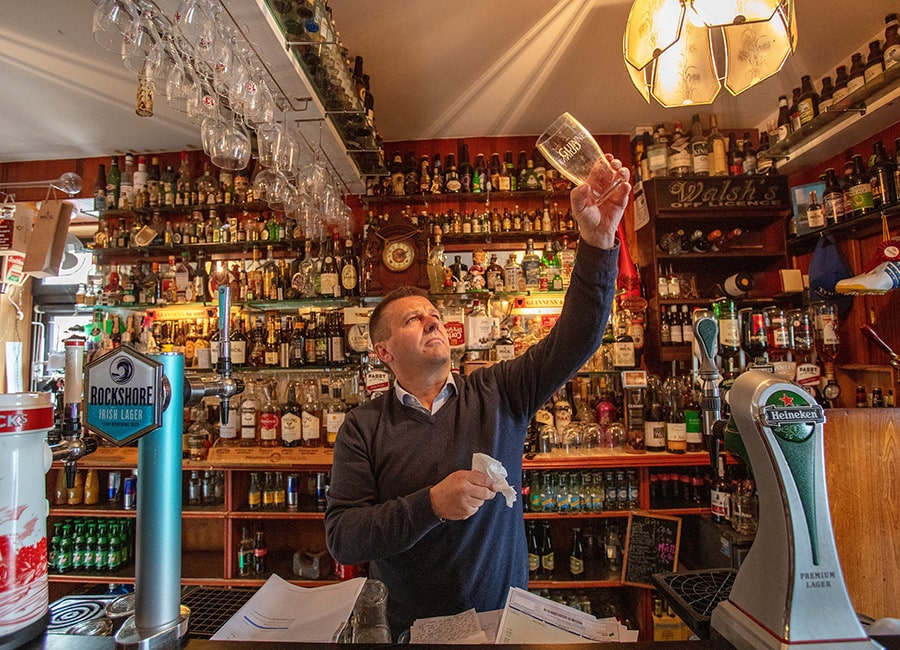The number of pubs in Ireland has fallen by a fifth (21%) since 2005, and there were 1,829 fewer pubs in 2021 than there were 16 years prior, an analysis by Drinks Industry Group of Ireland (DIGI) has found.
Some 349 pubs, or 4.9% of the nearly 8,630 pubs trading in Ireland in 2005, have closed since the Covid-19 pandemic hit, according to the group's analysis of Revenue licence data in The Irish Pub: Stopping the Decline report.
Laois has been the hardest hit county, reporting a 30.6% decline in pubs, while 23 counties have suffered decreases in excess of 10%, and Meath has seen the fewest closures with a decline of just 1.4% in pub numbers over the span. Dublin saw pub numbers fall 4.3%.
Three counties, Carlow (10.4%), Kildare (13.6%), and Wicklow (10.1%) showed decreases between 10% and 14.9% while Cavan (17.2%), Kerry (15.3), Kilkenny (18.1%), Monaghan (19.8%), and Wexford (17.2%), were in the 15%-19.9% reduction bracket.
Six counties, Clare (24.7%), Galway (20.6%), Louth (20.3%), Sligo (24%), Waterford (23.5%), and Westmeath (24.4%), were in the 20% to 24.9% decrease band.
And nine counties, Cork (28.5%), Donegal (26.3%), Leitrim (26.4%), Limerick (29.1%), Longford (25.7%), Mayo (25.1%), Offaly (29.9%), Roscommon (28.3%), and Tipperary (26.3%), saw decreases of between 25% and 29.9%.
In his analysis for the report, DCU Associate Professor Emeritus Anthony Foley cited concerns for the impact on rural Ireland when taken in consideration for the commercial capacity of small towns and villages with the closure of post offices, bank branches, Garda stations, local retailers.
"There is likely to be a negative social impact arising from the closure of the 1,829 public houses between 2005 and 2021. Pubs serve as a vital social outlet for many people, particularly in rural Ireland. With people living there faced by the spectre of rural decline, preserving the cultural heritage of the Irish pub in Ireland is arguably a progressive course of action," Foley sai.
"Economic and business sustainability is one of the several determining factors of closures of small public houses. Addressing high excise would have a positive effect on the commercial sustainability of small public houses and would be a strong element in the wider policy strategy to support rural areas. It is a measure which is completely within the scope of government.”

He also cited a number of reasons for the decline, including non-replacement of pub operators on retirement or death, low levels of business volume, regulatory changes such as tighter drink-driving laws and enforcement allied with weak public transport and population change and distribution, among others.
Paul Clancy, DIGI member and CEO of the Vintners Federation of Ireland, described the report findings as "alarming".
"1,829 rural pub closures represent businesses that provide jobs, a hub in the local community for socialising and community integration and a cultural centre which has long been documented as among the main attractions for tourists visiting Ireland," he said.
"The pace of decline increased as a result of the Covid-19 pandemic which saw the drinks and hospitality industry suffer the worst of all, with one of the longest lockdowns recorded globally.
“Considering this sharp decline and trend we’re witnessing; we need to monitor this industry carefully and ensure all the necessary supports are in place to contribute to stopping this trend. Our high alcohol excise tax is a cost and slows the growth of these businesses and impacts their day-to-day operations and bottom line.
"Exasperated currently with inflation and the cost of living. We are calling on the Government to reduce excise tax to support the industry with meaningful measures that will be felt immediately and reduce costs over night for tens of thousands of business owners.”
Kathryn D'Arcy, chair of DIGI and communications and corporate affairs director at Irish Distillers, added: "The Irish pub has been in a steady decline for years, and these stark figures once again highlight the need to secure the sustainable future of our pubs.
"Central to this is introducing policy measures which can make both an immediate difference and a long-term impact in terms of delivering sustainable policy to support these businesses. DIGI is seeking a reduction in Ireland’s high excise tax rate which would deliver on this.”
(Pic: Getty Images)











